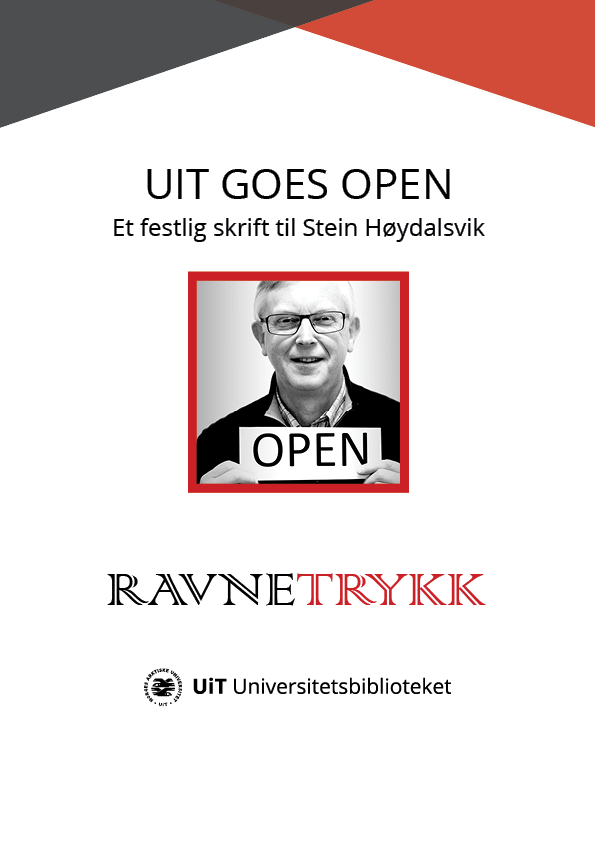Open Polar
A mid-way report toward a unique service
DOI:
https://doi.org/10.7557/15.5505Sammendrag
Data from the Polar Regions are of critical importance to modern research and decision makers. Regardless of their disciplinary and institutional affiliations, researchers rely heavily on the comparison of existing data with new data sets to assess changes that are taking effect. However, in a recent survey of 113 major polar data providers, we found that an estimated 60% of the existing polar research data is unfindable through common search engines and can only be accessed through institutional webpages. This raises an awareness sign of the need of the scientific community to harvest different metadata related to the Polar Regions and collect it in a homogenous, seamless database and making this database available to researchers, students and publics through one search platform. This contribution describes the progress in an ongoing project, Open Polar, started in 2019 at UiT The Arctic University of Norway. The project aims to collect metadata about all the open-access research data, articles and other scholarly documents related to the Polar Regions in a homogenous and seamless database. During the first six months of the project, the beta version of the user-interface was established, with a search by map and an advanced search function. An extensive geo-database that includes thousands of polar locations and their geographic information was collected from different sources. The geo-database together with a list of keywords (i.e. on sources, indigenous peoples, languages and other polar-related keywords) will be used in the filtration process. A Reference Board was formed, and the first board meeting took place in April 2020. The geographic definition of “Polar Regions” was defined in order to include most of the current geographic definitions of “Arctic”. The project is still facing some challenges that include for example integration with non-standard data sources who do not use Dublin Core Metadata schema, or are not harvestable through the Open Access Initiative’s standard protocol for harvesting (OAI-PMH).Referanser
Abu-Alam T.S. (2019). Open Arctic Research Index: Final report and recommendations. Septentrio Reports (No. 3). https://doi.org/10.7557/7.4682
AMAP (2011). AMAP Assessment 2011: Mercury in the Arctic. Arctic Monitoring and Assessment Programme (AMAP), Oslo, Norway. xiv + 193 pp. ISBN 978-82-7971-068-4
Arctic Council (2013). Summary for policy-makers. Arctic Resilience Interim Report. Stockholm Environment Institute and the Stockholm Resilience Centre to the Arctic Council's 8th Ministerial Meeting in Kiruna, Sweden. http://hdl.handle.net/11374/1629
Beck, I., Huffman, L. T., Xavier, J. C. C. & Walton, D. W. H. (2014). Education and Polar Research: Bringing Polar Science into the Classroom. Journal of Geological Resource and Engineering 4, 217-221. https://doi:10.17265/2328-2193/2014.04.004
Forbes, D.L. (2011). State of the Arctic Coast 2010 – Scientific Review and Outlook. International Arctic Science Committee, Land-Ocean Interactions in the Coastal Zone, Arctic Monitoring and Assessment Programme, International Permafrost Association. Helmholtz-Zentrum, Geesthacht, Germany, 178 p. http://arcticcoasts.org, ISBN 978-3-9813637-2-2
IPCC (2007). Climate Change 2007: Synthesis report, edited by Pachauri, R. K. & Reisinger, A. IPCC, Geneva, Switzerland, 104 pp. https://www.ipcc.ch/report/ar4/syr/
IPCC (2013). “Summary for Policymakers”. In Climate Change 2013: The Physical Science Basis, edited by Stocker, T.F., & Qin. D. H. Cambridge, United Kingdom and New York, NY, USA: Cambridge University Press, 1535 pp. https://www.ipcc.ch/report/ar5/wg1/
Johnson, N., Druckenmiller, M. & Pulsifer, P. (2019) The Exchange for Local Observations and Knowledge of the Arctic (ELOKA): Working towards interoperability of community-based data platforms. Polar Data Forum
Krupnik, I., Allison, I., Bell, R., Cutler, P., Hik, D., López-Martínez, J., Rachold, V., Sarukhanian, E. & Summerhayes, C. (2011). Understanding Earth’s Polar Challenges: International Polar Year 2007–2008. University of the Arctic, Rovaniemi, Finland /CCI Press, Edmonton, Alberta, Canada and ICSU/WMO Joint Committee for International Polar Year 2007–2008, 724 pp. ISBN 978-1-896445-55-7
Longva, L. & Høydalsvik, S. (2012). High North Research Documents: your source for research documents on the North. Polar libraries bulletin 68, 7-9. http://hdl.handle.net/10037/4733
Longva, L. (2011). NAROS: Northern Areas Open Scholarly Documents. http://DOI:10.7557/13.1312
Norsk Polarinstitutt, strategi 2019 – 2024. Retrieved from http://www.npolar.no/npcms/export/sites/np/files/vedlegg/strategi.pdf
Ricci, C.-A., Egerton, P. (2010). European Research in the Polar Regions: Relevance, strategic context and setting future directions in the European Research Area. Edited by the ESF European Polar Board for European Science Foundation, 24 pp. ISBN: 978-2-918428-30-5
Tenopir, C., Allard, S., Douglass, K., Aydinoglu, A. U., Wu, L., Read, E., Manoff, M. & Frame, M. (2011) Data Sharing by Scientists: Practices and Perceptions. Practices and Perceptions. PLOS ONE 6(6): e21101. https://doi.org/10.1371/journal.pone.0021101
Turner, J., Bindschadler, R.A., Convey, P., di Prisco, G., Fahrbach, E., Gutt, J., Hodgson, D.A., Mayewski, P.A. & Summerhayes, C.P. (2009). Antarctic climate change and the environment. Cambridge: Scientific Committee on Antarctic Research, 526 pp. ISBN 978-0-948277-22-1
Turner, J., Bracegirdle, T.J., Phillips, T., Marshall G.J. & Hosking, J.S. (2013). An initial assessment of Antarctic sea ice extent in the CMIP5 models. Journal of Climate 26, 1473–1484. https://doi: 10.1175/JCLI-D-12-00068.1
Wilkinson, M., Dumontier, M., Aalbersberg, I. & et al. (2016). The FAIR Guiding Principles for scientific data management and stewardship. Sci Data 3, 160018. https://doi.org/10.1038/sdata.2016.18





